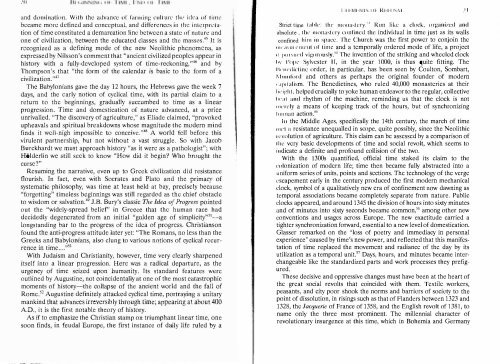CONTENTS - ouroboros ponderosa
CONTENTS - ouroboros ponderosa
CONTENTS - ouroboros ponderosa
You also want an ePaper? Increase the reach of your titles
YUMPU automatically turns print PDFs into web optimized ePapers that Google loves.
, 'II<br />
and domination, With the advance ot' farming c-ull ulT till" idea or lime<br />
became more defined and conceptual, and differences in the interpreta<br />
tion of time constituted a demarcation line between a state of nature and<br />
one of civilization, between the educated classes and the masss." It is<br />
rccognized as a dcfining mode of the new Neolithic phcnomena, as<br />
expressed by Nilsson's comment that "ancient civilizcd peoplcs appear in<br />
history with a fully-dcvcloped system of time-reckoning,"" and by<br />
Thompson's that "thc form of the calendar is basic to the form of a<br />
civilization, ,'47<br />
The Babylonians gave the day 12 hours, the Hebrews gave the week 7<br />
days, and the carly notion of cyclical time, with its partial claim to a<br />
return to the beginnings, gradually succumbed to time as a linear<br />
progression . Time and domestication of nature advanced, at a price<br />
unrivalled. "The discovcry of agriculture, " as Eliade claimed, "provoked<br />
upheavalS and spiritual breakdowns whosc magnitude thc modern mind<br />
finds it well-nigh impossible to conceive."'" A world fell before this<br />
virulent partnership, but not without a vast struggle. So with Jacob<br />
Burckhardt we must approach history "as it werc as a pathologist"; with<br />
Holderlin we still seck to know "How did it begin? Who brought the<br />
curse?"<br />
Rcsuming the narrative, even up to Grcek civilization did resistance<br />
flourish. In fact, evcn with Socrates and Plato and the primacy of<br />
systematic philosophy, was time at least held at bay, precisely because<br />
"forgetting" timeless bcginnings was still regarded as the chief obstacle<br />
to wisdom or salvation." J.8. Bury's classic The Idea of Progress pointed<br />
out the "widely-spread belief' in Grcece that the human race had<br />
decidedly degencrated from an initial "golden age of simplicity""'-a<br />
longstanding bar to the progress of the idea of progrcss. Christianson<br />
found the anti-progress attitude later yet: "The Romans, no less than the<br />
Greeks and Babylonians, also clung to various notions of cyclical recur-<br />
.<br />
,,51<br />
rcnce III t' Imc ....<br />
With Judaism and Christianity, however, time very clearly sharpened<br />
itself into a linear progression. Here was a radical departure, as the<br />
urgency of timc scized upon humanity. lts standard features were<br />
outlined by Augustine, not coincidentally at one of the most catastrophic<br />
moments of history-the collapsc of the ancient world and the fall of<br />
Rome.52 Augustine definitely attacked cyclical time, portraying a unitary<br />
mankind that advances irreversibly through time; appearing at about 400<br />
A.D., it is the first notable theory of history.<br />
As if to emphasize the Christian stamp on triumphant linear time, one<br />
soon finds, in feudal Europe, the first instance of daily life ruled by a<br />
,<br />
,<br />
l<br />
Strict time Iilhk: tilt' Il\tlllastl'ry.'d Run likc a dock, organized and<br />
absolute , Iht' Illonastery confined the individual in time just as its walls<br />
confmed ililll ill space. The Chureh was the first power to conjoin the<br />
1111',1',111 ('[lIl'lIt or time and a temporally ordered mode of life, a project<br />
" 1'"lSlll'd vigorously.'" The invention of the striking and wheeled clock<br />
I,v t','Ill' Sylvester II, in the year 1000, is thus quite fitting. The<br />
Ilt'lwdicl illc order, in particular, has been seen by Coulton, Sombart,<br />
tlllllt()Jd and others as perhaps the original founder of modern<br />
','1'"alism. The Benedictines, who ruled 40,000 monasteries at their<br />
II






